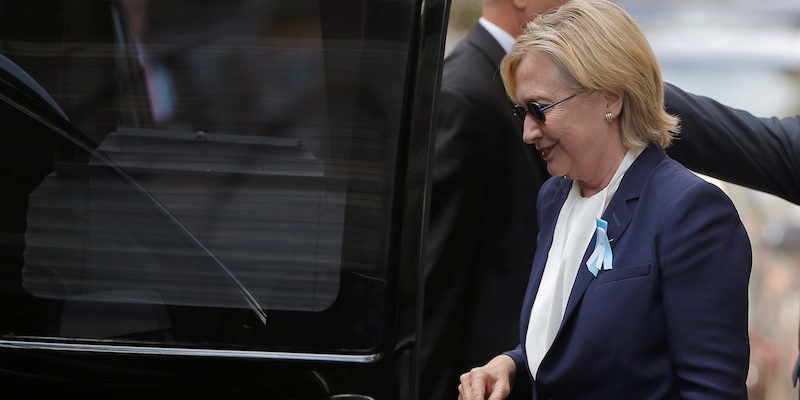
Hillary Clinton is facing a fresh crisis over her perceived trustworthiness following her collapse at a 9/11 memorial, as a poll showed that fewer than half of American voters believe that she is suffering from pneumonia.
The YouGov poll, commissioned by the Times in London, found that 46% of voters did not believe that Clinton was suffering from a mild version of pneumonia, and that a combination of the lung condition, allergies and overheating led to her fainting on Sunday.
About 45% of the 1,910 respondents from YouGov’s First Verdict panel did believe the explanation given by Clinton’s doctor after her campaign initially said the former secretary of state merely felt “overheated”. The remaining 9% of those asked said they were uncertain over the explanation.
The findings come as the Clinton campaign acknowledged that it mishandled news of the candidate’s pneumonia, which it admitted had been diagnosed on Friday. It was not disclosed even as campaign staff chided reporters for questioning bouts of coughing by Clinton at recent events.
Her press secretary, Brian Fallon, said: “In retrospect, we could have handled it better in providing more information. That’s on us. We regret that.”
The campaign now says the 68-year-old will release “additional medical information” from her doctor in the next few days “to further put to rest any lingering concerns”, but insists there are “no other underlying conditions, the pneumonia is the extent of it”.
The Republican candidate, Donald Trump, 70, has already sought to capitalise on the episode, with his campaign staff saying it demonstrated a familiar pattern of secrecy by Clinton. However, he has also been criticised for a lack of transparency over his health, as well as his finances. Trump has not released details of either his medical records or his tax returns.
On Sunday morning Clinton left the Ground Zero remembrance ceremony, marking the 15th anniversary of the 9/11 attacks, after an hour and 30 minutes. Video posted by a bystander to Twitter appeared to show her extremely unsteady and supported by aides, being helped from the curb into a vehicle.
She later travelled to her daughter’s apartment, and eventually to her home in Chappaqua, New York, before her campaign gave a more complete explanation of what had happened.
Lisa Bardack, Clinton’s doctor, said in a statement that the Democratic candidate had been suffering a cough “related to allergies”, but added: “On Friday, during follow up evaluation of her prolonged cough, she was diagnosed with pneumonia. She was put on antibiotics, and advised to rest and modify her schedule.
“While at [Sunday] morning’s event, she became overheated and dehydrated. I have just examined her and she is now rehydrated and recovering nicely.”
In a sign of the distrust of a woman widely regarded as an “establishment” candidate, Clinton’s reappearance outside her daughter’s apartment, in apparent high spirits just a few hours after collapsing, has fed conspiracy rumours that she uses a body double.
Vocativ, a news website which trawls social media and other databases for news and trends relating to public opinion, said it had discovered about 15,000 tweets using the hashtags #hillarysdouble, #hillarysbodydouble, and the words “Hillary” and “body double” between Sunday and Monday.



Expositores: Oscar Vidarte (PUCP) Fernando González Vigil (Universidad del Pacífico) Inscripciones aquí. Leer más
Una retrospectiva para entender los próximos cuatro años. Leer más
En la conferencia se hará una presentación de los temas más relevantes del proceso de negociación se llevó a cabo desde el 2012, así como del acuerdo de paz firmado entre el Gobierno colombiano y la guerrilla de las FARC a finales del 2016. Se analizarán los desafíos y las... Leer más
El Observatorio de las Relaciones Peruano-Norteamericanas (ORPN) de la Universidad del Pacífico es un programa encargado de analizar y difundir información relevante sobre la situación política, económica y social de Estados Unidos y analizar, desde una perspectiva multidisciplinaria, su efecto en las relaciones bilaterales con el Perú.
© 2026 Universidad del Pacífico - Departamento Académico de Humanidades. Todos los derechos reservados.

